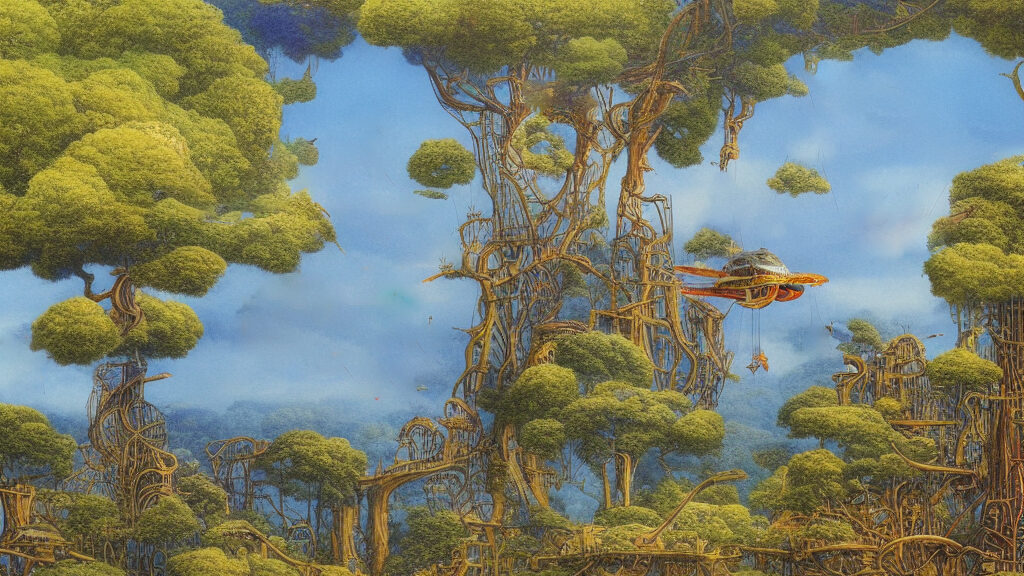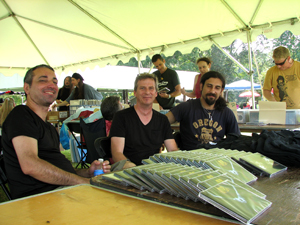
Mavara is a group of Iranian rock musicians who have relocated to the United States where they have been granted political asylum. They are now based in the New Hampshire area. I asked a couple of festivalgoers for their impression of Mavara’s performance. Jason and Cat from the Washington DC area described them as: “pretty good; intense. Heavy neo-progressive.” Another member of the audience, Toby, from Cary (North Carolina) said they were “good, entertaining.” The band’s American manager also described the band’s music as neoprog.
Mavara has three albums. Ultimate Sound (2007), Forgotten Inside (2009), and Season Of Salvation (2012). The current incarnation of the band includes keyboard player and band founder Farhood Ghadiri; Ashkan Hamedi on vocals; Arash Radan on electric guitar, Anis Oviesi on piano and keyboards, Sina Khodaiefar on bass; and American drummer James Welch.
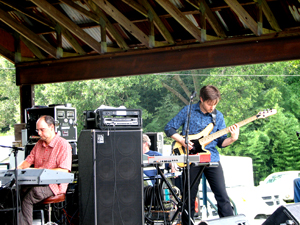
The second act on Saturday was renowned Canadian band Miriodor; which is normally described as a Rock In Opposition act. I was impressed by their balance of jazz, progressive rock and avant-garde classical and specially the interaction between Pascal Globensky’s keyboards and Bernard Falaise’s guitars. Festivalgoers Jason and Cat had difficulty describing Miriodor’s sound. Cat said it was “expressive.”
Miriodor played material from their new 2013 album titled Cobra Fakir, as well as fan favorites. Although Cobra Fakir doesn’t come out until September, Cuneiform Records had copies available at the festival. The new album features Bernard Falaise on guitars, stringed instruments; Pascal Globensky on keyboards, piano; Rémi Leclerc on drums, percussion, sampler.
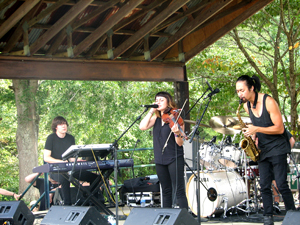
Next came one of the leading Zeuhl bands in North America, Corima. The audience was in for a wild ride. Zeuhl is the French progressive genre that was led by Magma, Weidorje and others. Corima has certainly captured the spirit of Zeuhl music. Their music has great intensity, based around a vibrant rhythm section and the very passionate improvisations and interactions between the saxophone, violin and piano/keyboards. Occasionally, the band drifted into tranquil moments of beauty with beautiful violin and piano neoclassical passages.
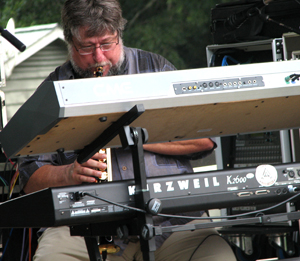
Before their concerts, I had the opportunity to talk to keyboardist and sax player Frank Wyatt. He’s one of the brains behind legendary group Happy the Man and the more recent reincarnation Oblivion Sun. Frank mentioned that he had suffered serious health issues and was happy to be at Progday ready to perform. I asked him if there was a chance of a Happy the Man reunion. He said that it was unlikely because keyboardist Kit Watkins is very disconnected from the music scene, sold most of his keyboards and is involved in organic farming [editor’s note: Watkins has not released any new material since 2006].
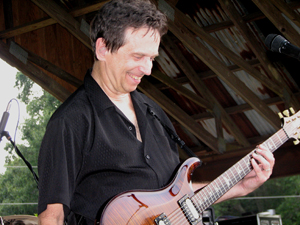
I made a pretty interesting discovery while visiting the Oblivion Sun table. They had Happy the Man and Oblivion Sun CDs for sale, but there was also an album titled Pedal Giant Animals by Wyatt and Whitaker. I asked someone about the music style and was informed that it was a short-lived band created after Happy the Man, similar to Happy the Man and Oblivion Sun. I bought the album and indeed, it’s great stuff. If you like Happy the Man, you need this album in your collection.
Frank Wyatt and Stanley Whitaker are two of the greatest progressive rock musicians that have come out of the United States and there was a lot of anticipation about the Oblivion Sun. The group played pieces from the brand new Oblivion Sun album titled The High Places, as well as a few familiar and cherished classics from the Happy the Man era.
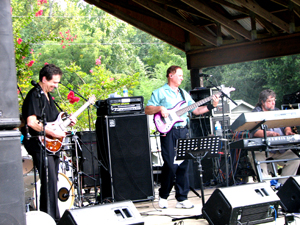
In addition to Frank Wyatt and Stanley Whitaker, Oblivion Sun features two outstanding musicians, who provide formidable support. Bill Brasso is one of those fabulous drummers who deliver a rich palette of creative drumming. David Hughes is a skilled bassist who delivers superb bass lines and also provides engaging vocals that interact perfectly with Whitaker’s vocals.
At one point in the concert Stanley Whitaker confirmed that he had been seriously ill and has survived cancer. He also mentioned Frank Wyatt’s health problems. The musicians were very thankful to be on stage again. The audience in turn was truly honored to have the opportunity to see these great musicians back on stage. It was a genuinely memorable concert.
